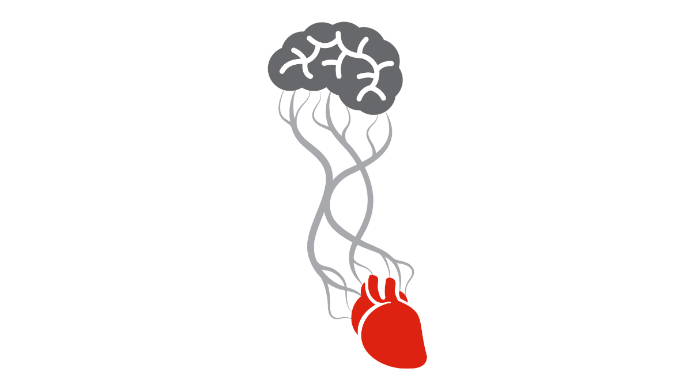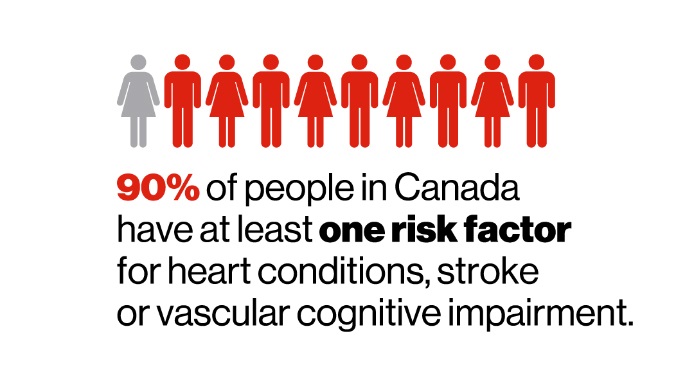This webpage is about the relationship between heart disease, stroke and vascular cognitive impairment (VCI). There are other diseases and conditions that affect the brain that can lead to dementia (including Alzheimer’s disease). Research is showing more and more that many of them may also be linked to the vascular system.
What is vascular cognitive impairment?
Vascular cognitive impairment is a disorder of the mind – the mental ability to be aware, to think and to feel.
VCI symptoms can range from forgetfulness to more serious problems with attention, memory, language, and executive functions like problem solving. The most serious form of VCI is called vascular dementia. Vascular dementia can cause difficulty doing even basic things like getting dressed and bathing.
Vascular dementia and Alzheimer’s disease share similar signs and symptoms, but they are not the same disease.
Causes
The heart and the brain are connected by the vascular system. The vascular system is a network of blood vessels that carry blood, oxygen and nutrients throughout your body. VCI may be caused by vessel wall disease or tiny clots that block small vessels in the brain, resulting in a lack of oxygen and damage to brain cells.

Symptoms of vascular dementia may develop gradually, or may appear suddenly after a stroke or major surgery, such as heart bypass surgery.
Who is at risk?
Anyone can be affected by vascular cognitive impairment, but your risk increases if you have a history of heart disease or stroke.

Heart, brain and mind conditions share many of the same risk factors. Having one condition puts you at a higher risk of developing others. Preventing one condition can prevent others. These relationships are deep and complex, and need more research. The risk factors for VCI are:
1 Pre-existing heart disease or stroke
- stroke
- heart attack
- heart failure
- structural heart disease (for example, heart valve disease)
- congenital heart disease
- atrial fibrillation
- cardiac arrest
2 Condition risk factors
3 Lifestyle risk factors
- unhealthy diet
- not enough physical activity
- unhealthy weight
- smoking (including cannabis)
- too much alcohol
- birth control or hormone replacement therapy
- recreational drug use
- stress
4 Risk factors you cannot control
- age – the older you are, the higher your risk
- sex – a woman’s risk of heart disease and stroke changes over her lifetime
- South Asian or African heritage
- Indigenous heritage
- family history of heart disease, stroke or TIA, or vascular cognitive impairment
- personal circumstances – challenges accessing healthy food, safe drinking water, health services and social services
Once you experience stroke, a heart condition or VCI, it becomes an additional risk factor for other heart and brain conditions.
Symptoms
Vascular cognitive impairment symptoms usually appear gradually and get worse over time as more damage to blood vessels occurs. Symptoms can range from mild problems with forgetfulness, concentration and thinking, to more severe and widespread problems. The most serious form of VCI is called vascular dementia.
VCI can affect your mind’s executive functions. These are a set of mental processes to help you problem solve and get things done. Some executive functions are:
- planning
- organising
- processing information
- multi-tasking
- decision making
- reasoning
- finding your way around
Diagnosis
It can be difficult to tell VCI apart from other types of cognitive impairment because the symptoms of each type overlap. There isn’t a specific test that can diagnose VCI. People who show symptoms of vascular cognitive impairment may be referred to a healthcare professional for further diagnosis.
Many people are unaware of the connections between stroke, heart conditions and VCI. If you have had a stroke or have a heart condition, ask your doctor to screen you for VCI symptoms, especially if you start to notice any changes in thinking or memory.
Treatment
The management of vascular cognitive impairment often includes treating the health conditions and risk factors that have contributed to VCI. It is important to know and control your blood pressure, diabetes and blood cholesterol.
Your doctor might suggest cognitive rehabilitation, medication and lifestyle changes.
There are several tools that can be used to help slow down the disease and to help with cognitive rehabilitation, such as drills, practice exercises, environmental changes and computer-based tools.
If you are prescribed medication, here are some tips for managing your medications.
It is also important to lead a healthy lifestyle:
- Be smoke-free.
- Be more active.
- Eat a healthy balanced diet – there are some specific diets you can follow that have been proven to reduce the risk of heart disease.
- Aim for a healthy weight.
- Drink less alcohol.
- Manage stress.
Living with vascular cognitive impairment
It’s normal to feel worried or afraid if you are experiencing cognitive challenges. Find someone you can turn to for emotional support like a family member, friend, doctor, mental health worker or support group. Talking about your emotions and feelings could be an important part of your journey to recovery.
VCI is often the result of stroke or heart disease. If you have experienced either, the recovery and support sections for heart disease and stroke are full of practical advice and tips to support you on your recovery journey.
- Download Living Well with Heart Disease
- Download Your Stroke Journey
- Join Heart & Stroke’s Community of Survivors or Care Supporters’ Community support groups.
- Sign up for the Heart & Stroke recovery newsletter. Get the latest research news and information, with tips and strategies to help you manage your recovery.
The best things you can do to manage your physical health are to:
- Know your personal risk factors for heart disease, stroke and vascular cognitive impairment.
- Reduce your own risk by making healthy lifestyle choices.
- Know the signs of a heart attack, cardiac arrest or stroke.
Related information
Take the first step and work with your doctor to better understand your risks.
The Beat: The surprising heart-brain connection (podcast)
See the Heart & Stroke report on heart-brain-mind links.
Learn about Heart & Stroke funded research into covert strokes and dementia.
If you are diagnosed with cognitive impairment or dementia, it can be overwhelming. The Alzheimer Society is a great place to start learning about living with dementia.
